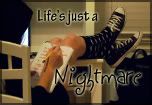Metafiction (Checklists)

Good ol' Wikipedia defines 'metafiction' as: a type of fiction that self-consciously addresses the devices of fiction, exposing the fictional illusion. It is the literary term describing fictional writing that self-consciously and systematically draws attention to its status as an artifact in posing questions about the relationship between fiction and reality, usually irony and self-reflection. It can be compared to presentational theatre, which does not let the audience forget it is viewing a play; metafiction does not let the reader forget he or she is reading a fictional work. As, really, when has Wikipedia ever been wrong? I really do love this subgenre. It's much trickier than Breaking The 4th Wall, because you've got to play around the Wall. Often associated with modern or postmodern fiction. It's not so blatant and obvious. Here are some example situations, as helpfully explained by (yeah) Wikipedia:
I really do love this subgenre. It's much trickier than Breaking The 4th Wall, because you've got to play around the Wall. Often associated with modern or postmodern fiction. It's not so blatant and obvious. Here are some example situations, as helpfully explained by (yeah) Wikipedia:
A novel about a writer creating as story (mild)
A novel about a reader reading a novel
A novel that features itself as it's own prop or plot device (see: Hitchiker's Guide to the Galaxy)
Story within a story (Sophie's World)
A story referencing the specific conventions or tropes of a story (characters, title, paragraphing, plots, etc.)
A story where the narrator intentionally exposes themselves as the author.
A novel where the book itself seeks interaction with the reader (see: House of Leaves)
Anything non-linear
Narrative footnotes in a story or novel, commenting on the story while furthering it (see: Everything is Illuminated)
A novel where the author (not the narrator) is a character (see: JPod, Everything is Illuminated, A Series of Unfortunate Events, Life of Pi, anything by Kurt Vonnegut (Jr.)). This is not to be confused with an autobiography or memoir, as this character is, again, not the narrator.
"A novel in which the author/narrator spends the entire book comparing life notes with an author-ghost from another era"
A parallel novel which has the same setting and time period as a previous work, and many of the same characters, but is told from a different perspective (see: Rosencrantz and Guildenstern Are Dead, in parallel with Hamlet)
Any situation that features magical or illogical scenerios appear in an otherwise realistic setting (One Hundred Years of Solitude by Gabriel García Márquez)
Some examples of metafilm include: Adaption., by Spike Jonze, Fellini's 8 1/2, anything involving Charlie Kaufman, anything involving the creation of a movie, anything by Michael Winterbottom (especially Tristam Shandy: A Cock and Bull Story, itself adapted from The Life and Opinions of Tristram Shandy: Gentleman), TV shows where the theme song is whistled, hummed, or sung by a character, anything that "directly references another work that internally references the first work" (like: Weird Al appearing on The Simpsons, while he himself sings Simpsons-referencing songs).
Characters aware they are in a work of fiction (Stranger Than Fiction, where the whole plot involves Will Ferrell finding out he is in a work of fiction)
Characters in a film or a television series who mention and/or refer to the actors or actresses that portray themselves.
Characters who do things because those actions are what they would expect from characters in a story (Scream)
"A real pre-existing piece of fiction X, being used within a new piece of fiction Y, to lend an air of authenticity to fiction Y" (Wes Craven's New Nightmare frequently discusses A Nightmare on Elm Street, while actors from the latter play 'themselves' in the former).
A story where the author is not a character, but interacts with the characters (Breakfast of Champions) A story within which the very story itself (or a story based on it) is a work of fiction (I don't know, the Supernatural novels or something).
A story within which the very story itself (or a story based on it) is a work of fiction (I don't know, the Supernatural novels or something).
None of this is to be confused with meta-referential, which would, for example, be a blank page in a book that says "This page is intentionally left blank". Then, of course, it would not be blank, but that's a whole new ballpark.
Kiss Kiss Bang Bang is riddled with meta.
The Hitman movie has the eponymous character diving through a window, only to find two children playing the Hitman video game.
Funny Games might be this, or it might just be Breaking The 4th Wall. I'm leaning towards the latter, though.
Last Action Hero, but ugh.
the term "metafiction" was first coined by William H. Glass, author of The Tunnel, in the 1970 essay “Philosophy and the Form of Fiction”.
I would look into books and movies of this type, as they are kind of awesome. Especially books by Jasper Fforde.


































.jpg)























1 comments:
Woody Allen's Stardust Memories is very much his 8 1/2
Post a Comment